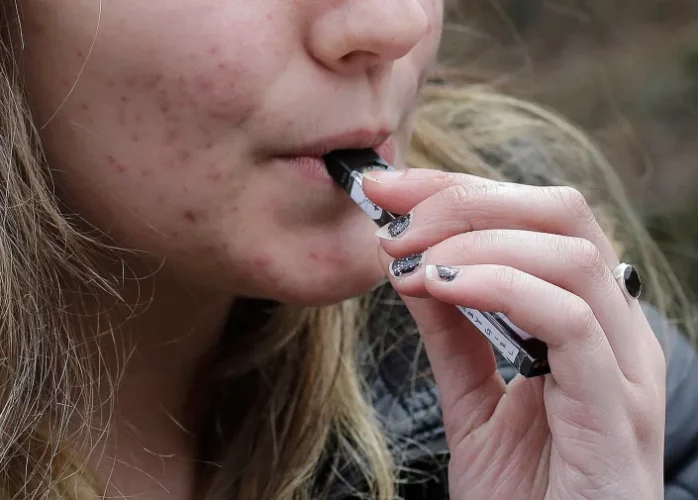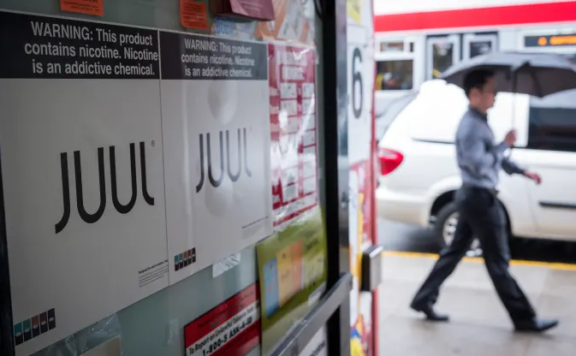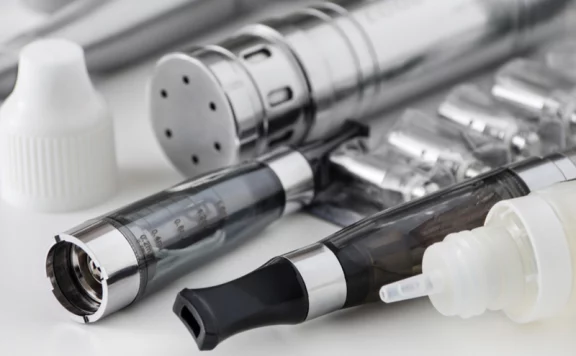Punishment for vaping at school not strict enough, three administrators from Rapides Parish requested changes to the vaping policy on Tuesday, speaking to a committee of the school board about overdoses that have occurred on campuses and the difficulty in determining what chemicals students are inserting in the pens.
Sons Pathoumthong, Alexandria Senior High School’s deputy principal of discipline, said, “Over the past five years, we’ve seen this vaping just become a pandemic with our pupils, even in middle schools. These youngsters today are simply extremely brazen with their vaping, which is what we’re dealing with.”
On September 20, during the education committee meeting, board member Wilton Barrios requested an explanation of the district’s vaping policy to determine whether the sanctions for using illicit substances in vaporizers are equivalent to those for smoking tobacco.
“Most administrators would probably tell you that they’re being treated the same way, and I think that’s terrible,” he said. “Is that accurate or is that false?”
If the substances were prohibited, Superintendent Jeff Powell assured him, it wouldn’t be the same. If there is a “reasonable suspicion” that what a pupil is eating is illegal, according to him, schools may subject them to drug testing. If illegal, “the ramifications are different,” he warned.
Barrios questioned whether the individual conducting drug tests could turn down a principal’s request to take one.
According to Clyde Washington, executive assistant superintendent of administration, principals must fill a reasonable suspicion checklist and forward it to the district’s drug coordinator, who “reviews the facts to determine if it’s adequate to proceed with the test.”
Barrios claimed that some administrators’ requests had been turned down, and Washington had informed him that tests would not be administered if the request wasn’t acceptable. The checklist, according to Powell, is based on legal requirements, therefore there needs to be “real reasonable suspicion.”
When the lengthy checklist was sent to the board members by Washington, board president Dr. Stephen Chapman inquired as to whether or not parents are informed when their child will be subjected to a drug test. Powell claimed that while parents are informed when there is cause for suspicion, their consent is not required for the test.
Sandra Franklin, a board member, questioned whether a student’s possession of a vaping pen would immediately result in a drug test. Powell answered no.
Mark Roberts, the principal of Oak Hill High School, questioned the panel over how much of the reasonable suspicion checklist must be completed before a drug test may be conducted. According to him, principals feel as though they must defend the need for the test when they notice something that doesn’t seem proper.
Powell questioned Roberts about his opinion on the matter of a drug test being triggered by the use of a vape pen. Roberts paused, noting that if it is marijuana, the smell would be sufficient to support the reasonable suspicion.
But he added that some items made nowadays do not cause vaping pens to form clouds. He claimed that because pupils were using them in the restrooms at school, there were signs up warning that only one person could use each stall at a time.
“We’re having students crowd into stalls, three, four, or five at a time, and when we can’t even detect that a vape is being used, “said Roberts. “They might not show the symptoms if they puff on the vaporizer. I’m also afraid since I don’t know what’s in the vape.”
According to Roberts, using a vape should be treated similarly to using cigarettes, and serial offenders should be sent to the Rapides Alternative Positive Program for Students (RAPPS), which serves as an expulsion facility
The principal of Pineville High School, Karl Carpenter, displayed a vape pen that had been seized at his institution that day and reminded students that only adults age 21 and older should make purchases. He claimed that when pupils are caught using a pen or vaping, they aren’t immediately tested.
Carpenter shared Roberts’ worries about not knowing what substances adolescents using vape pens at school are inhaling.
I have no idea what they are adding, he said. “Last year, we often called ambulances to transport students from my campus back to the hospital so that they might receive medical attention. Because of these problems, we have started giving Narcan on our campus.”
Drug overdoses can be treated immediately with Narcan.
He claimed that students don’t consider a three-day in-school punishment to be significant. He argued that pupils who disobey the rule should be suspended for a minimum of three days.
Carpenter admitted that even though he is not a doctor, it disturbs him when he is told that there is not enough reasonable suspicion to conduct a drug test on kids who he observes to have glassy eyes or other symptoms. He recommended looking into the locations where college students purchase their vape pens.
“I support far harsher punishments for vaping on my campus,” he declared.
He claimed that although the documents might be completed, nobody from the central office in downtown Alexandria would visit the schools to observe “this slobbering, snot-slinging” adolescent who, in his opinion, requires a drug test.
“And that annoys us in the school,” he added
Pathoumthong sided with the other administrators, stating that he didn’t think the penalty was appropriate. Additionally, he mentioned that alcohol possession by students at RAPPS results in a 30-day suspension and that vaping pens are forbidden for individuals under the age of 21.
He claimed that he served on the committee some years ago that decided to treat owning a vaporizer the same as carrying alcohol “since it is unlawful.”
He concurred with Carpenter in saying that he doesn’t know what the students are vaping. He claimed since the introduction of vaping pens the market has transformed. And that they are no longer pricey and are instead easily obtained from any corner store.
According to Pathoumthong, children are not only utilizing the devices but also selling them.
“When I had the conversation with Ms. Butler (Shewanda Butler, the district’s Safe and Drug-Free School coordinator) about the new policy this year, I was appalled solely because it became less punitive,” he stated. “And the consequences should be larger when we look at a situation that worsens.”
He claimed that a three-day in-school suspension was insufficient.
According to him, harsher punishments are required if the district genuinely cares about the security of its students and campuses.
“Because these kids are going to make more bad decisions on campus when they’re under the influence, even of a vaping device,” he said. “I genuinely think that. They will continue to make terrible decisions if they are brazen enough to vape in a classroom.”
Mark Dryden, a board member discussed how quickly—often instantly—students might be harmed by the substances they inhale via vaping pens. He mentioned that, though he left out the date, a Buckeye High School student nearly perished in that manner.
If Narcan wasn’t available on campus, he claimed, “We would have lost that child.”
To return to the stricter regulation that was in effect in 2019, the committee approved a substitute proposal 2-1. The move was supported by committee member Darrell Rodriguez and chair Linda Burgess. Franklin cast a no vote.
The entire board ought to discuss the motion at its regularly scheduled meeting on October 4.







